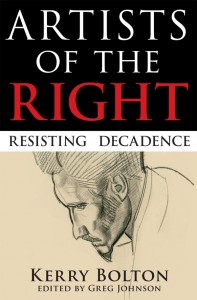Remembering Ezra Pound
(October 30, 1885 to November 1, 1972)
Greg Johnson
“A slave is one who waits for someone else to free him.” — Ezra Pound
One of the ongoing projects of the North American New Right is the recovery of our tradition. One does not have to go too far back before one discovers that every great European thinker and artist is a “Right Wing extremist” by today’s standards.
What is even more remarkable is the number of great 20th century figures who belong in our camp as well. And among these figures, Ezra Loomis Pound is one of the most illustrious and one of the most radical.
Pound is lauded even by his enemies as one of the giants of modernist poetry. Speaking personally, however, Pound’s poetry long stood in the way of appreciating his genius as a critic, a translator, an essayist, an economist, and a political commentator.

You can buy Greg Johnson’s The White Nationalist Manifesto here.
I like a lot of modern literature, but to my ear Pound pushes its intellectualist and reflexive characteristics to the extreme and offers very little with immediate naive and sensuous appeal. For instance, as far as I have been able to determine, he never wrote anything in danger of being set to music by Andrew Lloyd Webber.
Appreciating Pound’s poetry presupposes a vast humanistic education of the sort long unavailable in American universities. Of course it doesn’t hurt to have such an education, even if one does not end up liking Pound. A good place to begin such an education is Pound himself, through reading his many volumes of essays and criticism, which I find absolutely compelling. Pound’s art is very long, and life very short. But you owe it to yourself to try. In the end, you have nothing to lose but your ignorance.
I suggest you begin where I did, with Impact: Essays on Ignorance and the Decline of American Civilization (Chicago: Henry Regnery Company, 1960), which brings together all of Pound’s central interests, cultural, historical, artistic, political, and economic. A similar overview is provided by Selected Prose 1909-1965 (New York: New Directions, 1973). After that, read his Guide to Kulchur (New York: New Directions, 1970).
For Pound’s political views, seek out Jefferson and/or Mussolini (1935) (New York: Liveright, 1970). Then read his WWII radio broadcasts: Ezra Pound Speaking: Radio Speeches of World War II (Contributions in American Studies) (Westport, Conn.: Greenwood Press, 1978), a sample of which is printed below.
Finally, read his economic pamphlets, reprinted below, the ideas of which are ably summarized by Carolina Hartley in “Ezra Pound on Money.”
For Pound’s views on literature, see his Literary Essays of Ezra Pound, ed. T. S. Eliot (New York: New Directions, 1968), The Spirit of Romance (New York: New Directions, 1968), and ABC of Reading (1934) (New York: New Directions, 1960).
To tackle Pound’s poetry, all you need is two books: The Library of America’s massive volume Ezra Pound: Poems and Translation (New York: Library of America, 2003), which contains everything except Pound’s magnum opus The Cantos (New York: New Directions, 1971).
I also wish to draw your attention to works on this website:

You can buy Kerry Bolton’s Artists of the Right here.
By Pound:
- ABC of Economics
- “America, Roosevelt, and the Causes of the Present War.”
- “An Introduction to the Economic Nature of the United States.”
- “England,” Ezra’s Pound’s Radio Broadcast of March 15, 1942
- “The Four Steps.”
- “Gold and Work.”
- Jefferson and/or Mussolini
- Hugh Selwyn Mauberley, Part 1
- “Materialism,” Ezra Pound’s Radio Broadcast of June 26, 1943
- Pier Paolo Pasolini Interviews Ezra Pound
- “Religio or, The Child’s Guide to Knowledge.”
- “Sestina: Altaforte.”
- “Social Credit: An Impact.”
- Two Cantos with Recordings of Pound’s Recitations
- “What is Money For?.”
Poetic Tributes to Pound:
- Robinson Jeffers, “War-Guilt Trials.”
- Leo Yankevich, “Ezra Pound Enters the Tent.”
About Pound:
- Anonymous, “Ezra Pound and Vivaldi.”
- Kerry Bolton, “Breaking the Bondage of Usury,” Part 2 and Part 3
- Kerry Bolton, “Ezra Pound” from Artists of the Right
- Jonathan Bowden, “Ezra Pound” (audio version; reprinted in Reactionary Modernism)
- Alex Fontana, “Ezra Pound on Endless Trial.”
- Adam Franz, “Ezra Pound’s Jefferson and/or Mussolini.”
- Andrew Hamilton, “A Yankee Poet in Greenwich Village.”
- Carolina Hartley, “Ezra Pound on Money.”
- Carolina Hartley, “James Angleton and Ezra Pound.”
- Nicholas Jeelvy, “Jonathan Bowden’s Reactionary Modernism.”
- Beatrice Mott, “This Difficult Individual Eustace Mullins — and the Remarkable Ezra Pound.”
- Michael Collins Piper, “What Did Ezra Pound Really Say?” (Czech translation here)
- Quintilian, “Ezra Pound’s Guide to Kulchur.”
- Kathryn S., “By the Twisted Word, Slain; By the Good Word, Saved . . . & Other Stories, Part III“
- Miguel Serrano, “The Death of Ezra Pound.”
- Miguel Serrano, “Ezra Pound and the Angel.”
- Stead Steadman, “Pagan Pound.”
Pound is also frequently tagged in Counter-Currents articles dealing with art and economics.
Remembering%20Ezra%20Pound%0A%28October%2030%2C%201885%20to%20November%201%2C%201972%29%0A
Share
Enjoyed this article?
Be the first to leave a tip in the jar!
* * *
Counter-Currents has extended special privileges to those who donate at least $10/month or $120/year.
- Donors will have immediate access to all Counter-Currents posts. Everyone else will find that one post a day, five posts a week will be behind a “paywall” and will be available to the general public after 30 days. Naturally, we do not grant permission to other websites to repost paywall content before 30 days have passed.
- Paywall member comments will appear immediately instead of waiting in a moderation queue. (People who abuse this privilege will lose it.)
- Paywall members have the option of editing their comments.
- Paywall members get an Badge badge on their comments.
- Paywall members can “like” comments.
- Paywall members can “commission” a yearly article from Counter-Currents. Just send a question that you’d like to have discussed to [email protected]. (Obviously, the topics must be suitable to Counter-Currents and its broader project, as well as the interests and expertise of our writers.)
To get full access to all content behind the paywall, please visit our redesigned Paywall page.
Related
-
Nowej Prawicy przeciw Starej Prawicy Rozdział 2: Hegemonia
-
Nowej Prawicy przeciw Starej Prawicy, Rozdział 1: Nowa Prawica przeciw Starej Prawicy
-
Nowej Prawicy przeciw Starej Prawicy: Wprowadzenie
-
Nowej Prawicy przeciw Starej Prawicy: Przedmowa
-
Notes on Plato’s Alcibiades I Part 2
-
Earth Day Special
-
Notes on Plato’s Alcibiades I Part 1
-
Counter-Currents Radio Podcast No. 582: When Did You First Notice the Problems of Multiculturalism?


7 comments
This is a great resource. I have read Spirit of romance many times. It’s not political, merely literary, but I just found it really interesting and the translations that pound provides along the way highly graceful and memorable. Some are not to be found anywhere else, such as the translation in the neo Latin poets section, which I found highly valuable.
I read Joseph Brodsky’s book about Venice called watermark, and it was kind of highly interesting. Had some sub text about pound in it. Have you guys noticed that they are trying to create a New World order “alternamyth” to pound in Joseph Brodsky? Brodsky was a prominent Russian Jewish poet, who was supposedly so persecuted, this time by the Soviet authority, and an exile from them. He did still win the Nobel prize so he couldn’t be that persecuted. It parallels pounds persecution and suffering, some of which might be kind of cryptic and not well understood anymore by literary figures or ones unfamiliar with the “IT.” Brodsky was supposed to have this lifelong love of Venice, and he was buried in Venice, in the same cemetery where pounds grave is. Whereas pounds grave is neglected, Brodsky’s is feted, and a pilgrimage site with all these devotional things left on it by admirers. Pound actually did not want to be buried in Venice, he actually live there for the remainder of his life, but wanted to be buried in his hometown in Idaho, with that hideous, modern sculpture of him over his grave. Anyway, I don’t see that Brodsky had any strong connection to Venice having never lived there. It seems pointed that they buried him exactly the same cemetery as pound. It’s like they wanted to create this alternative of this suffering martyr of a person who is a great literary figure with a grave in Venice, for people to make pilgrimages to like an alternative myth for literati to cling to, a Jewish figure rather than an “antisemite.” I hope that someday make a pilgrimage to the graveyard, and I will definitely leave devotional things on pound’s grave!
They want their Pound of flesh! Lol, is that corny?
Here’s one little aside about Pound that I always thought was interesting. When I was reading his biography, the author, who included quite a few pieces of Pound’s early works, included what I can only describe as a “practice piece.” Pound had written a poem in the EXACT metre of Gerard Manley Hopkins’ “God’s Grandeur.”
As you already know, “God’s Grandeur” is a very unique work in terms of metre and pacing. There’s nothing else like it, and its form and rhythm stays with you. Well, low and behold, I’m reading this early poem by Pound and it was an exact rhythmic imitation of Hopkins’ piece.
Cool.
Which bio was that? Most poets’ biography is not really worth reading, but pound’s is interesting at a number of levels.
I’m actually looking for it now. I read it in the 90s, so it’s probably much older. If I find it I’ll get back to you.
Since the biography I was reading was vol 1, I am going to assume it’s the one by Noel Stock, a three-volume work published in the 70s. I’ve become intrigued by this recollection of Pound’s early poetry, so I am going to purchase a used copy of the Stock bio just to see if I’m correct. If I am, I’ll let you know on some other post.
Comments are closed.
If you have Paywall access,
simply login first to see your comment auto-approved.
Note on comments privacy & moderation
Your email is never published nor shared.
Comments are moderated. If you don't see your comment, please be patient. If approved, it will appear here soon. Do not post your comment a second time.
Paywall Access
Lost your password?Edit your comment